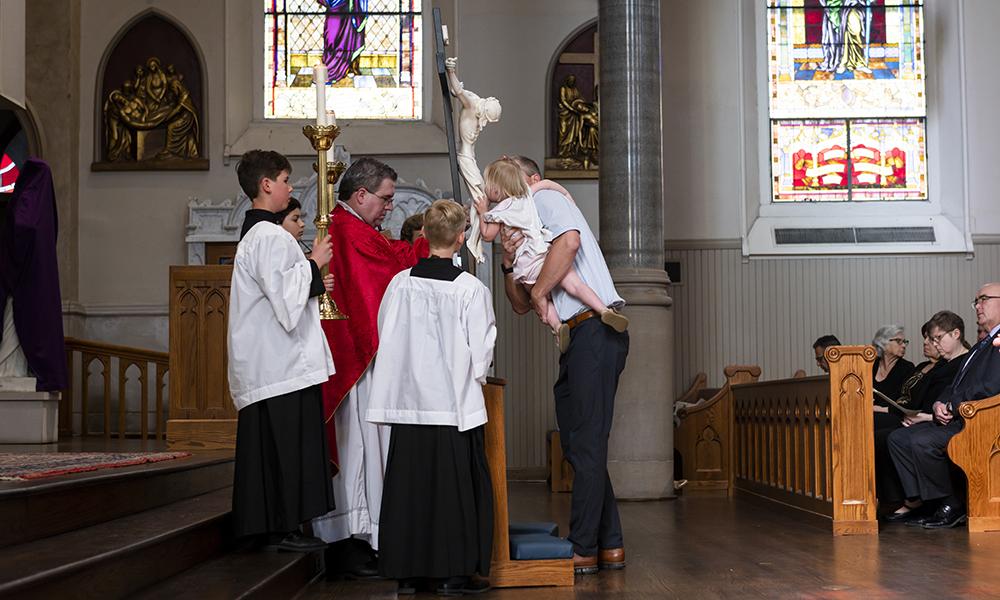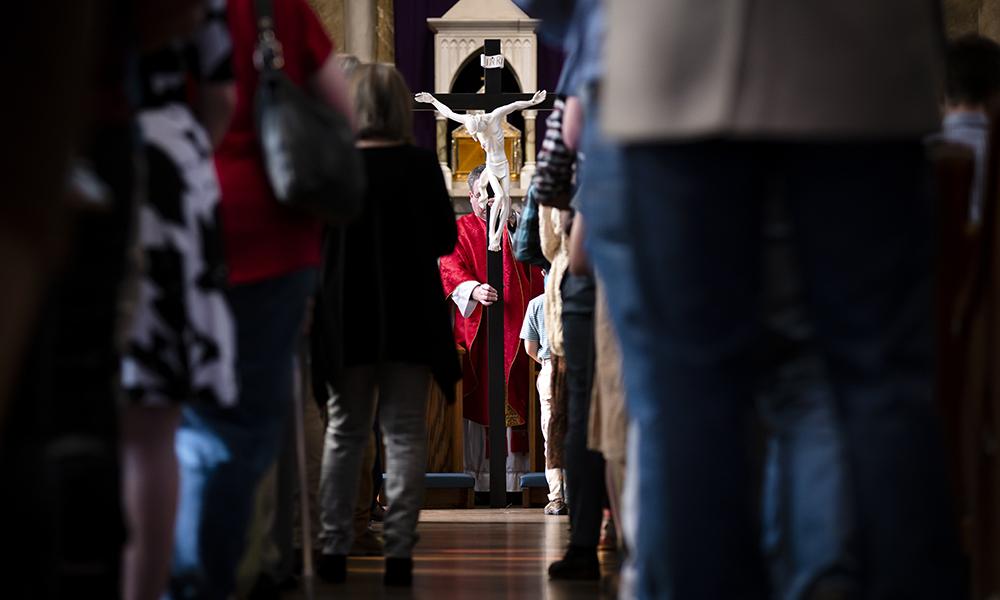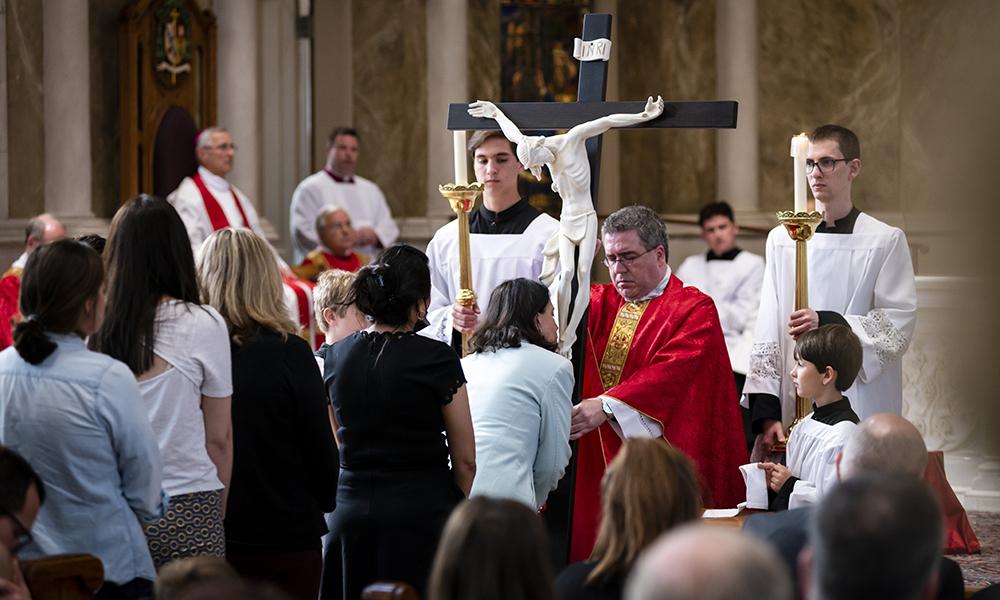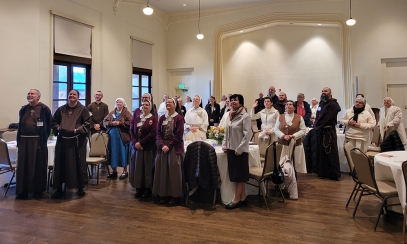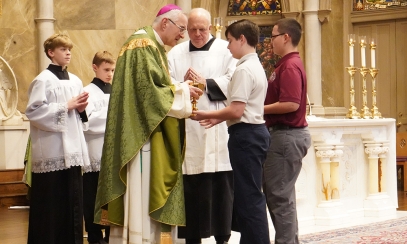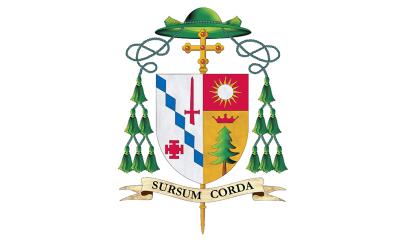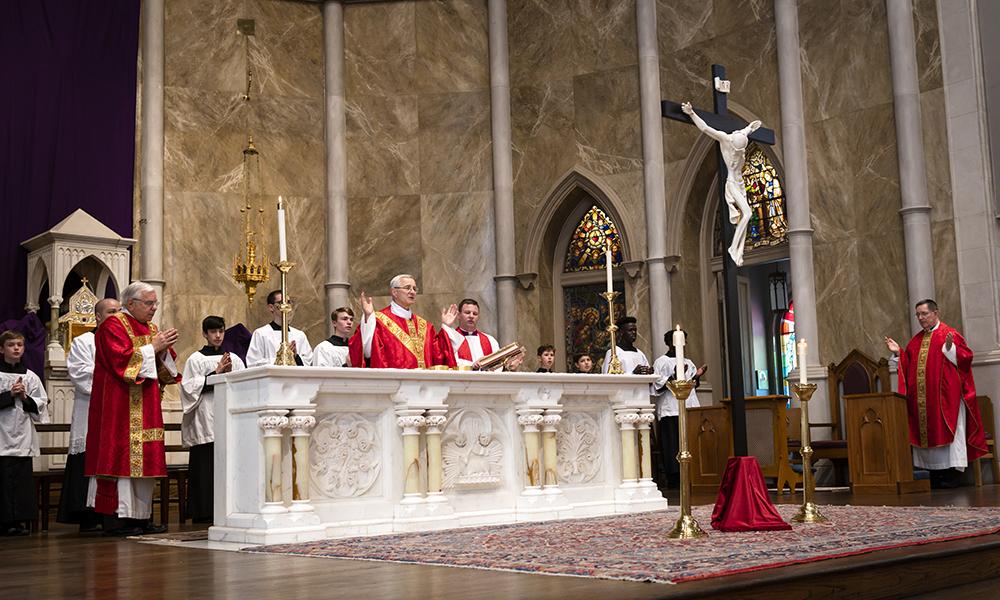
‘By Your Holy Cross, You Have Redeemed the World’
Solemn Celebration of the Lord’s Passion
Solemn Celebration of the Lord’s Passion
On April 15, Bishop Raica marked Good Friday with the solemn celebration of the Lord’s Passion at the Cathedral of St. Paul. The complete text of his homily follows herein.
On April 15, Bishop Raica marked Good Friday with the solemn celebration of the Lord’s Passion at the Cathedral of St. Paul. The complete text of his homily follows herein.
My friends, celebrating the Stations of the Cross in several parishes in our diocese this Lenten season was a beautiful gesture that recalled the “depths of Christ’s love for us.” Walking with Jesus on the Way of the Cross reminded me so much of my own unworthiness to be the recipient of God’s merciful embrace. Why would He even go through the trouble – that much trouble – for me? Compared to the world and the universe, I feel so insignificant, like a grain of sand on the seashore before an immense universe that is measured in exponential light years. At the same time, there is so much inside of me that says, “I’m not all I should be.” Afterall, I sin! I get up again! Sometimes, I try but don’t seem to make any headway. Occasionally, I just want to throw in the towel and say, “What’s the use!” I don’t always acknowledge that God’s grace is enough for me or that it can overwhelm my own sinfulness with the attraction to the good. It is like I cannot forget my faults and failings, my wounds, or my heartaches. Yes, it can be hard to be a person who exudes what Pope Francis called the “Joy of the Gospel!” Nevertheless, we are shown mercy and chosen (miserando atque eligendo from Venerable Bede).
Perhaps that’s the reason why we have crosses and crucifixes everywhere – in our churches, in our classrooms, in our Catholic hospitals, in our homes. We wear them as jewelry. They are part of our rosaries. We see them in cemeteries and on the side of the road in simple shrines where someone was killed in an auto accident. Or, as a variant, the St. Andrew’s cross (the X) dots every railroad crossing and appears on our state flag in Alabama. We are confronted with the cross everywhere.
My reflections today suggest to me that we could consider the cross as a language, which has its own vocabulary and grammar that speaks to us. It speaks to our experience right down to the deepest parts of our hearts. It is symbolic of the language not of defeat, but of love!
Gazing on the cross allows us to be drawn into its challenge. The cross poses many questions for us – individually, in our culture, in the various communities that we find ourselves. Even our societies are not immune from the questions that the cross proposes. Remember those images of when the World Trade Center in New York imploded? After the dust settled, and amid the rubble and ash, a cross of I-beams was revealed. The cross must be something very powerful because in some places, some cultures and countries, it is prohibited to display it or, in the day-to-day operation of some companies, to wear it as a piece of jewelry. It’s interesting, though, isn’t it that the cross itself proposes the notion that there exists real paths to resolve human dilemmas and give a fundamental meaning to life.
Our own experience of life demonstrates that we bear the wounds of our past faults and failings, our sins. At times, suffering, tragedy, physical or psychological pain, and even death fill our historical memory. No one is exempt. We find coping mechanisms, for sure, or we try to forget or anesthetize the pain in various ways. Other times, it is hard to let go or forgive ourselves for past mistakes where we have been hurt or have hurt someone else and can’t figure out a way to “take it back.”
One thing is clear: Jesus did not invent the cross. He embraced it on His journey, like each of us. But there is a newness to His message that is transformational for all of us. The newness is that the cross is also a symbol of love. Love turned the Way of the Cross into a Way of Life. Love became that bridge between my littleness and nothingness, turning it into something with grandeur and majesty. I have yet to understand and embrace it – from a nobody to a somebody, from death and life. The cross itself became a symbol, a vocabulary of love – a grammar of our transformation into something more that we could not do by ourselves.
In a personal way, the cross embraces each of us. At the same time, it entrusts us with an important responsibility. It is a responsibility that opens us up to embrace one another, to walk with each other, to accompany each other on the journey of life as well. That’s why we are here Sunday after Sunday! Like our Lord entrusting John to Mary, His mother, and Mary to John, her new Son, we are to be there for each other, for the crosses that each bears. There are many things that put us, too, at the foot of the cross: relationships that have gone sour, illnesses for which we don’t find a solution, disappointments or failures at work or school, helplessness in the face of injustice, hardened hearts that have become embittered, jealous, envious, or resentful, and so forth.
This cross carries with it a language, vocabulary, and grammar that helps us face these and other challenges of life. After all, we are speaking about the cross of Christ, not just any cross. We are speaking about a person Who redeemed us, not just a nice idea! Our challenge in accompanying one another is to transform our mundane crosses into the very cross of Christ. Our cross can seem hopeless and ambiguous – a burden. Christ’s cross is bright and radiant, for it bears the name of love, through which we have been saved.
Yes, it is the cross that reflects the language, vocabulary, and grammar we need for our discipleship. It is a language of love – true love – ultimately concerned about our ultimate destiny! “I did this … ‘for you,’” we hear whispered as a word in our heart. Why is He doing this? Because He loves you and loves me. He did this because you are loved more than anything else – Jesus would have done the same thing had you been the only person in the world. It is not our way, our neatly packaged, antiseptic, and anesthetized way. It is His way – the way of the cross, the way of love. It is the cross we venerate today because on it hung the Savior of the world in the greatest act of love.
“We adore you, O Christ, and we praise you! Because by Your holy cross, You have redeemed the world!” And, not only the world, but because by Your holy cross You have redeemed me, too! Thank you, Lord!

